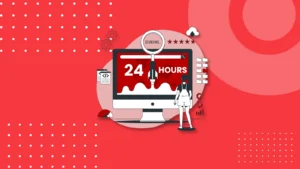
Introduction
Google has introduced a new feature on its Search Console, known as the ’24 Hours’ view. This feature was designed to help website owners, marketers, and SEO experts monitor the recent performance of their content and modify their strategies accordingly.
What Does the Latest Update Offer?
This latest update will help Search Console users access data from the last 24 hours, minimizing the usual delay in performance reporting by approximately 50% while offering faster insights.
Previously, it could take up to two days for data to show up in the Search Console, causing unnecessary delays in responding to emerging trends and identifying new possibilities.
Now, users will be able to view real-time information on:
-
Clicks:
The number of people visiting a website from Google
-
Impressions:
How often a website’s content appears on the Search Pages
-
Click Through Rate (CTR):
Percentage of users who clicked on a website’s content after seeing it.
-
Average Position:
A website’s ranking on Google for specific queries.
The ‘24 hours’ view will display the most recent data and will appear in the Search Results, Discover, and Google News Performance reports.
It also includes an hourly graph that will show trends, allowing users to understand the daily performance patterns.
This view will display the data in the user’s local time zone based on their browser settings so that the insights correspond with the customer’s behaviors.
The updates are being introduced gradually but across all properties, so users may not observe the changes right away. This slow approach guarantees a seamless incorporation of the new features.
(Source)
How will the ‘24 Hours View’ Update Benefit SEO Professionals?
The key advantage of the 24-hour view is its ability to provide quick and useful information.
For instance:
-
Finding new content:
Observe how a blog post, product page, or announcement performs shortly after being published.
-
Spotting the latest trends:
Recognize the keywords that are driving traffic and modify the content accordingly.
-
Reacting quickly:
Make changes to headings, descriptions, or keywords to enhance engagement based on what the data displays.
-
Improving Campaigns:
Use real-time data to integrate organic search performance with paid ad strategies.
If data is lacking due to continuous collection, Google indicates that with a dotted line, making it easier to tell the difference between completed information, and what’s still in progress.
Why This Matters
This update is an advantage for anyone who depends on Google Search Console to improve their online visibility. Google is helping users to make quicker decisions by cutting the data delay by 50%.
This will help businesses to:
- Modify their campaigns during peak time
- Respond faster to issues such as a decrease in traffic, and unexpected trends.
- Get a better understanding of how their content performs throughout the day.
This latest update could be a game-changer for digital marketing agencies. Before this update came into effect, making real-time changes was very difficult as performance data was delayed by a day or two. But now, marketers can monitor the instant impact of their efforts and modify their strategies without having to wait for days.
Tips For Using This Latest Feature Effectively
-
Evaluating website content regularly:
Use the ‘24-hour’ view regularly to keep up with the latest trends.
-
Set performance objectives:
Set the criteria for success for important metrics such as impressions or Click Through Rate (CTR) and closely monitor them.
-
Adapt for time zones:
Using data that corresponds with the local time zone to strategically scheduling posts or updates during peak engagement time.
-
Integrate other tools:
Incorporate tools such as Google Trends along with the ‘24-hour’ view to get a better understanding of audience behavior.
-
Perform experiments promptly:
Try changing the headings, and descriptions and monitor the impacts with the hourly data.
Looking Ahead
This update highlights the growing demand for faster and more adaptable solutions. Businesses and a SEO agency must continue to be adaptable in order to stay relevant in the highly competitive digital market.
As Google moves closer to real-time information processing, businesses should expect further advancements in the upcoming months. Modern methods such as AI-driven recommendations and predictive analysis will be implemented by Google in the future.